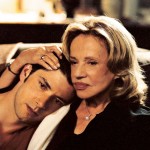Dir. by Francois Ozon
I hadn’t planned to write about Le Temps qui reste. As has been the case with the few other Ozon films I’ve seen, it feels slight and undernourished, like a short story pushed to novella length. Melvin Poupaud plays Romain, a thirty-ish fashion photographer who, in the opening moments of the film, is diagnosed with cancer. Rather than suffer the side-effects of aggressive treatment, he decides, instead, to accept the three-month life expectancy given him. He decides, also, to keep his condition a secret — the first of several head-scratching choices that alienate him from everyone in his life. At a family dinner, he humiliates his sister with a barrage of savage insults. At home, he matter-of-factly breaks off his relationship with his boyfriend. By the time the film reaches its inevitable conclusion, Romain is quite literally alone. (Ozon’s final image is frustrating. I still haven’t decided how I feel about it.)
I hadn’t planned to write about Le Temps qui reste, but then, while typing up notes this morning, I tripped over this line from E.L. Doctorow’s The Book of Daniel: “My sister and I can never inflict total damage — that is the saving grace. The right to offend irreparably is a blood right.” In Doctorow’s novel, Daniel and Susan Lewin are the son and daughter of characters modeled closely on Julius and Ethel Rosenberg, the young Jewish couple executed in the summer of 1953 for giving the secret of the A-bomb to the Soviets. Daniel’s line, I think, has a doubled meaning. As the child of traitors, he has inherited a particular ability to offend, to enlarge and extend personal grievances into a wider sphere of influence. But he and Susan have also inherited a particularly tragic history and, with it, the right to offend. “He’s such a bastard,” acquaintances must surely think, “but give him a break. Can you imagine all he’s been through?”
In Le Temps qui reste, Romain tells only one member of the family about his illness, his grandmother, played by Jeanne Moreau. Their brief scene together is the most interesting in the film. He’s drawn to her by their shared relation to the world — both will be leaving it soon — and she is likewise alone, alienated from family and community. During a late-night conversation, she confesses to having had a string of lovers soon after her husband’s death. She is unapologetic, though, and refuses to judge the friends, family members, and neighbors who so callously judged her at the time. “They didn’t understand,” she tells Romain, his head resting on her shoulder. “I would have died otherwise. It was survival instinct.”
When Ozon introduced Le Temps qui reste at TIFF, he called it a “personal and secret” film, and, while I have no interest in psychoanalyzing Ozon or presuming to extrapolate conclusions about his life, I do suspect the film’s “secret” is closely related to Romain’s and his grandmother’s “survival instincts.” For Doctorow, Daniel’s “right to offend” has political connotations. The Book of Daniel is, in Doctorow’s words, “the story of the American left in general and the generally sacrificial role it has played in our history.” Daniel is a walking, breathing reminder of an iconic and tragic past. He has, in a sense, earned his right to disrupt our complacent social mores.
Ozon’s film is a smaller, more personal (and, ultimately, less successful) work of art, but it’s no less transgressive. I also like its ambitions. When Romain first learns of his prognosis, he immediately asks, “Is it AIDS?” I’m not gay, and I worry that I’m wading into dangerous critical waters here, but Le Temps qui reste works most effectively as a study of, for lack of a better word, gay psychology. Romain dies of cancer, but he’s haunted by the same specter of mortality that floats through the work of so many queer artists of the AIDS era. It’s important that we hear the word, I think. And it’s also important that we’re reminded of the difference between heterosexual and homosexual mortality — that is, the procreative aspect of sex, the ability to share DNA with one’s lover in the formation of a new life that will carry on beyond one’s own. A side plot involving Romain’s decision to impregnate a woman whose husband is impotent, though underdeveloped in the film, does touch upon some quality of gay psychology (again, excuse the poor choice of words) that I seldom see addressed in films. It’s another of Ozon’s “secrets,” I suspect. Another survival instinct.
